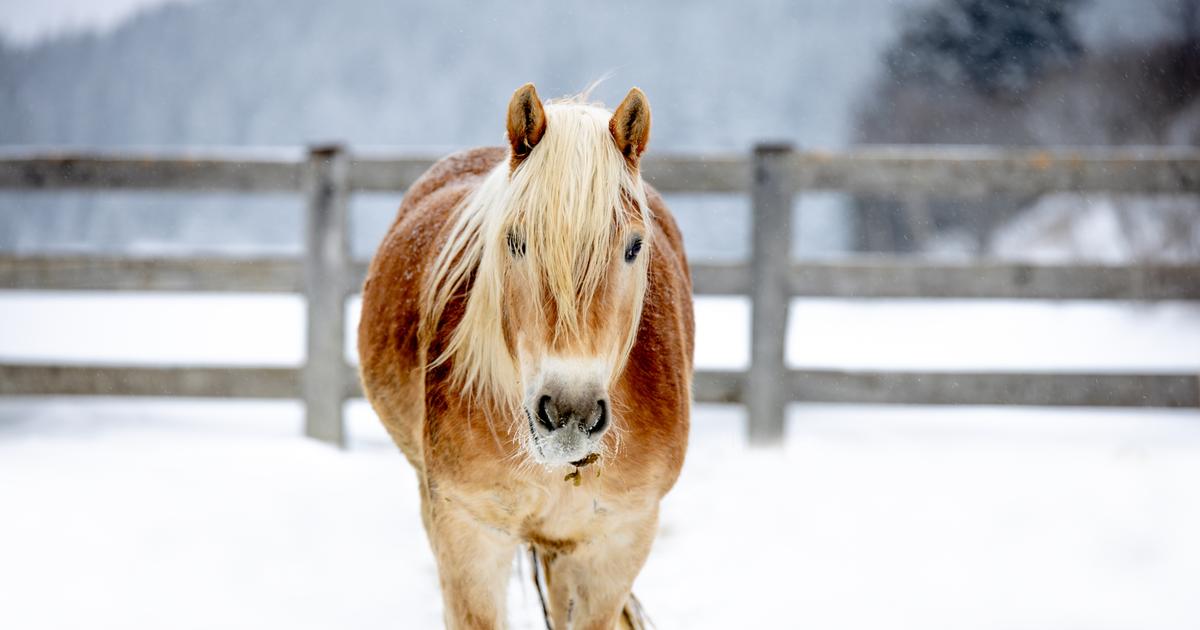A new dispute is raging in the EU: The use of reserve antibiotics on animals is to be restricted.
The veterinary association is storming - at the request of Merkur.de, both sides raise allegations.
Brussels - It's about health - in a field where things can get serious very quickly: In the EU, a dispute is raging over the use of reserve antibiotics in animals. A new regulation is planned. Also in order to avoid new forms of resistance that are dangerous for humans. But of course animals also have a right to health, argues the other side. German veterinarians are very concerned about the plans - and are upset.
The focus is on the EU Veterinary Medicines Regulation 2019/6.
On more than 40 pages it is suggested to largely ban the use of reserve antibiotics in animal husbandry.
The law is expected to come into force in 2022.
After several years of negotiations, however, many questions still seem unanswered: At the request of
Merkur.de
, the Federal Association of Practicing Veterinarians (bpt) and the Greens make serious allegations - there is even talk of “fake news”.
Reserve antibiotics: Green politician calls for a ban on factory farming
The EU Committee on Environmental Issues, Public Health and Food Safety, or ENVI for short, is largely responsible for the regulation. The committee is supposed to determine which antibiotics should be reserved exclusively for humans, i.e. which should not be used in animals. MEP Martin Häusling was the responsible negotiator for the Greens in the years-long attempt to reach a resolution. In an interview with
Merkur.de
, the agricultural policy spokesman for the Greens / EFA group justifies the planned ban on reserve antibiotics for animal use with advantages for people.
Because of the significant increase in the use of antibiotics in recent years, people have built up resistance.
In other words: more and more antibiotics are losing their effectiveness.
Antibiotic resistance causes around 33,000 deaths within the EU every year because the effect is lost, explains Häusling.
Animal husbandry contributes massively to the spreading resistance;
therefore countermeasures must be taken.
Reserve antibiotics - i.e. substances that are used in infections with bacteria that are already resistant to common antibiotics - should therefore no longer be used in animal use, he demands: They should be reserved for humans.
"The numbers are drastic, we have to react."
EU plan: veterinary association rumbling - "that would mean the death of many animals"
The veterinary association disagrees. He's started a signature campaign. It is intended to induce the German MEPs to rethink. "Animal owners must find out what is going on in Brussels largely in secret and what consequences the decision to be feared will have for their animals," says the call. The fact is that "the European Parliament ignores scientific facts and not only, as is led, farm animals are affected by a ban, but all animal species," explained BPT President Siegfried Moder in a press release.
“For the good of all animals, we must therefore ensure that all antibiotics approved for veterinary medicine are still available for treatment in the future.
Otherwise, in the worst case, it would mean the death of many animals, ”concludes Moder.
Certain animals are dependent on antibiotics.
One recognizes the disadvantages of an excessive use of antibiotics in animal husbandry, but one should not generalize.
"That is why it makes little sense to regulate the use of antibiotics in animals more and more, instead of taking a closer look at where antibiotics are used excessively and where resistances really arise in the masses."
Reserve antibiotics: "For me, human health takes precedence over the interests of cheap fattening"
Häusling can only shake his head at this criticism. The prohibition on the use of reserve antibiotics refers expressly to mass farming, not individual animal husbandry: “We do not want antibiotics to continue to be used on a large scale in fattening. They must not be used to compensate for deficiencies in animal husbandry. ”In chicken or turkey husbandry, antibiotics such as colistin would be mixed into the drink water or feed, says the former Hessian member of the state parliament. “It is used there even though 99 percent of the animals are not sick at all. This is a problem because it has been sufficiently established that antibiotic-resistant germs can be found on the meat. ”It is therefore imperative that the use of reserve antibiotics be restricted.
Häusling emphasizes that the plan does not provide for these regulations to apply to individual animals as well: "We have expressly said that the use of reserve antibiotics in individual animal use is permitted in life-threatening conditions for the animal." that animals are recognized as “sentient beings”, argues, is “complete nonsense”, because it is explicitly about factory farming “and not about the fact that we let animals die.” One wants to limit the use to “absolute emergencies” and the “ forbid general use in healthy animals ”, explains Häusling.
"For me, human health is above the interests of a cheap mast."
+
Martin Häusling (r) with the Greens co-boss Robert Habeck.
The European politician has been a party member since the founding of the Greens in Hesse in 1979.
© Mike Schmidt / Imago
Dispute over reserve antibiotics: "Fake News" allegations on the part of the veterinary association
The veterinary association, on the other hand, is irritated by the statements of the Green politician. "This point of view is totally incomprehensible to me," explains board member Andreas Palzer in an interview with
Merkur.de
. "Mr. Häusling is hiding a very important story here, namely that of the legal and political framework." According to the veterinary association, it is not at all possible to apply the drug ordinance 2019/6 only to individual animal species. “Legally, there is absolutely no way to do this, because this origin regulation does not provide for the differentiation between the animal species. Either all or none. "
In addition, everyone knows "that this regulation, which has been discussed for eight years, is very unlikely to be reopened to create such an exception." In addition, negotiations had already taken place in the discussion process as to whether the ban for individual animal species should be relaxed could. “But there was no political majority.” The veterinarian practicing near Lake Constance comes to a clear conclusion: “If the Häusling report is carried through now, it will definitely affect all animal species.” Häusling's argument, the use of reserve antibiotics Allowing “absolute emergencies”, i.e. when animals are about to die, is therefore not tenable. "The animals suffer and die because they no longer receive any treatment," warns Palzer.
Häusling, on the other hand, counters that the veterinary association spread false claims and argued “irrelevantly”.
“Of course, the distinction between the animal groups can be regulated.
This differentiation can be made in every ordinance. ”Because of the current ordinance, it is not possible,“ but that's exactly the problem. ”That is why his group has tabled a resolution so that the Commission can make this distinction.
Palzer meanwhile leave Häusling's statements "a little speechless".
The vet says to the MEP: "How you can accuse us of fake news is totally incomprehensible."
Reserve antibiotics: Veterinary Association relies on EMA recommendation and one-health approach
The veterinary association is amazed at the point of view of parts of the EU committee. The fact that a “clear recommendation” by the European Medicines Agency (EMA) is being ignored is “unbelievable”, says Palzer. “Human medicine says that human medicine is at risk. But one cannot seriously assume that the EMA will present a draft regulation that endangers human health. We're talking about the EMA - professionals whom we trust in corona vaccine development. I can not comprehend that."
The background: The EMA had submitted a recommendation to the committee, together with the European Food Safety Authority (EFSA), the European Center for Disease Prevention and Control (ECDC) as well as the World Organization for Animal Health (OIE) and the World Health Organization (WHO ). The paper lists criteria for defining the classes of antibiotics that the experts say can then be used in animals.
Based on the one health approach, human and veterinary medicine are equally taken into account in the recommendation.
To put it simply, the One Health approach takes the view that human health is closely related to that of animals and the environment.
In view of the EMA recommendation to only allow certain antibiotics for veterinary medicine, the veterinary association cannot understand the “blanket prohibition position” of the Greens, among others.
In any case, comparatively few classes of antibiotics that are also available in human medicine are used in animals.
Reserve antibiotics: CSU politician Mortler wants to "master the problem together" - EPP group still undecided
Which (reserve) antibiotics should be reserved exclusively for humans in the future will be decided in September. Not all political groups have already clearly positioned themselves. The Greens are calling for rigorous regulation. The EPP Group, to which the CDU / CSU belongs, is still divided. MEP Marlene Mortler (CSU) advocates including veterinary medicine in the decision-making process. "Human and veterinary medicine can only master cross-sectoral problems together," Mortler told
Merkur.de.
The former drug commissioner of the federal government also sits on the committee for environmental issues, public health and food safety and could imagine that antibiotics will continue to be used in animals. "Sick animals also have a right to adequate treatment," says the native of Central Franconia. “The tighter the noose, the fewer antibiotics there will be in the end. There must be no therapy emergency - neither for humans nor for animals. "
The debate about the use of reserve antibiotics will probably occupy the EU committee and the veterinary association for a while. Currently, the positions of the association founded in 1919 and individual MEPs are still far apart. In addition to the content, this is apparently also due to different legal understandings. By the time the decision comes into effect in January 2022, these legal framework conditions should be better clarified.
(as)













